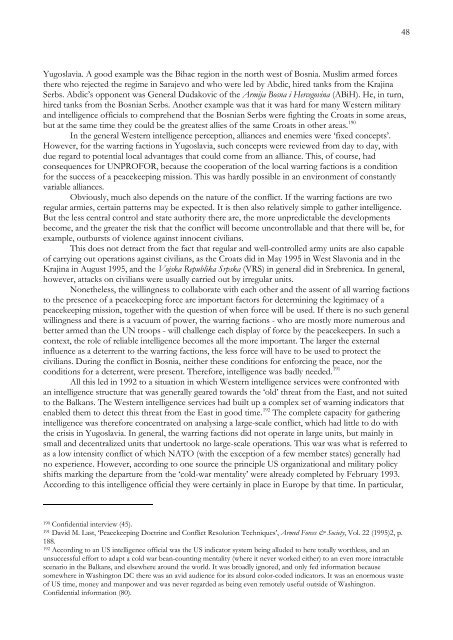C. Wiebes - Intelligence en de oorlog in Bosnië 1992-1995. De rol van de inlichtingen- en veiligheidsdiensten - Engels
C. Wiebes - Intelligence en de oorlog in Bosnië 1992-1995. De rol van de inlichtingen- en veiligheidsdiensten - Engels
C. Wiebes - Intelligence en de oorlog in Bosnië 1992-1995. De rol van de inlichtingen- en veiligheidsdiensten - Engels
- No tags were found...
You also want an ePaper? Increase the reach of your titles
YUMPU automatically turns print PDFs into web optimized ePapers that Google loves.
48Yugoslavia. A good example was the Bihac region <strong>in</strong> the north west of Bosnia. Muslim armed forcesthere who rejected the regime <strong>in</strong> Sarajevo and who were led by Abdic, hired tanks from the Kraj<strong>in</strong>aSerbs. Abdic’s oppon<strong>en</strong>t was G<strong>en</strong>eral Dudakovic of the Armija Bosna i Hercegov<strong>in</strong>a (ABiH). He, <strong>in</strong> turn,hired tanks from the Bosnian Serbs. Another example was that it was hard for many Western militaryand <strong>in</strong>tellig<strong>en</strong>ce officials to compreh<strong>en</strong>d that the Bosnian Serbs were fight<strong>in</strong>g the Croats <strong>in</strong> some areas,but at the same time they could be the greatest allies of the same Croats <strong>in</strong> other areas. 190In the g<strong>en</strong>eral Western <strong>in</strong>tellig<strong>en</strong>ce perception, alliances and <strong>en</strong>emies were ‘fixed concepts’.However, for the warr<strong>in</strong>g factions <strong>in</strong> Yugoslavia, such concepts were reviewed from day to day, withdue regard to pot<strong>en</strong>tial local ad<strong>van</strong>tages that could come from an alliance. This, of course, hadconsequ<strong>en</strong>ces for UNPROFOR, because the cooperation of the local warr<strong>in</strong>g factions is a conditionfor the success of a peacekeep<strong>in</strong>g mission. This was hardly possible <strong>in</strong> an <strong>en</strong>vironm<strong>en</strong>t of constantlyvariable alliances.Obviously, much also <strong>de</strong>p<strong>en</strong>ds on the nature of the conflict. If the warr<strong>in</strong>g factions are tworegular armies, certa<strong>in</strong> patterns may be expected. It is th<strong>en</strong> also relatively simple to gather <strong>in</strong>tellig<strong>en</strong>ce.But the less c<strong>en</strong>tral cont<strong>rol</strong> and state authority there are, the more unpredictable the <strong>de</strong>velopm<strong>en</strong>tsbecome, and the greater the risk that the conflict will become uncont<strong>rol</strong>lable and that there will be, forexample, outbursts of viol<strong>en</strong>ce aga<strong>in</strong>st <strong>in</strong>noc<strong>en</strong>t civilians.This does not <strong>de</strong>tract from the fact that regular and well-cont<strong>rol</strong>led army units are also capableof carry<strong>in</strong>g out operations aga<strong>in</strong>st civilians, as the Croats did <strong>in</strong> May 1995 <strong>in</strong> West Slavonia and <strong>in</strong> theKraj<strong>in</strong>a <strong>in</strong> August 1995, and the Vojska Republika Srpska (VRS) <strong>in</strong> g<strong>en</strong>eral did <strong>in</strong> Srebr<strong>en</strong>ica. In g<strong>en</strong>eral,however, attacks on civilians were usually carried out by irregular units.Nonetheless, the will<strong>in</strong>gness to collaborate with each other and the ass<strong>en</strong>t of all warr<strong>in</strong>g factionsto the pres<strong>en</strong>ce of a peacekeep<strong>in</strong>g force are important factors for <strong>de</strong>term<strong>in</strong><strong>in</strong>g the legitimacy of apeacekeep<strong>in</strong>g mission, together with the question of wh<strong>en</strong> force will be used. If there is no such g<strong>en</strong>eralwill<strong>in</strong>gness and there is a vacuum of power, the warr<strong>in</strong>g factions - who are mostly more numerous andbetter armed than the UN troops - will chall<strong>en</strong>ge each display of force by the peacekeepers. In such acontext, the <strong>rol</strong>e of reliable <strong>in</strong>tellig<strong>en</strong>ce becomes all the more important. The larger the external<strong>in</strong>flu<strong>en</strong>ce as a <strong>de</strong>terr<strong>en</strong>t to the warr<strong>in</strong>g factions, the less force will have to be used to protect thecivilians. Dur<strong>in</strong>g the conflict <strong>in</strong> Bosnia, neither these conditions for <strong>en</strong>forc<strong>in</strong>g the peace, nor theconditions for a <strong>de</strong>terr<strong>en</strong>t, were pres<strong>en</strong>t. Therefore, <strong>in</strong>tellig<strong>en</strong>ce was badly nee<strong>de</strong>d. 191All this led <strong>in</strong> <strong>1992</strong> to a situation <strong>in</strong> which Western <strong>in</strong>tellig<strong>en</strong>ce services were confronted withan <strong>in</strong>tellig<strong>en</strong>ce structure that was g<strong>en</strong>erally geared towards the ‘old’ threat from the East, and not suitedto the Balkans. The Western <strong>in</strong>tellig<strong>en</strong>ce services had built up a complex set of warn<strong>in</strong>g <strong>in</strong>dicators that<strong>en</strong>abled them to <strong>de</strong>tect this threat from the East <strong>in</strong> good time. 192 The complete capacity for gather<strong>in</strong>g<strong>in</strong>tellig<strong>en</strong>ce was therefore conc<strong>en</strong>trated on analys<strong>in</strong>g a large-scale conflict, which had little to do withthe crisis <strong>in</strong> Yugoslavia. In g<strong>en</strong>eral, the warr<strong>in</strong>g factions did not operate <strong>in</strong> large units, but ma<strong>in</strong>ly <strong>in</strong>small and <strong>de</strong>c<strong>en</strong>tralized units that un<strong>de</strong>rtook no large-scale operations. This war was what is referred toas a low <strong>in</strong>t<strong>en</strong>sity conflict of which NATO (with the exception of a few member states) g<strong>en</strong>erally hadno experi<strong>en</strong>ce. However, accord<strong>in</strong>g to one source the pr<strong>in</strong>ciple US organizational and military policyshifts mark<strong>in</strong>g the <strong>de</strong>parture from the ‘cold-war m<strong>en</strong>tality’ were already completed by February 1993.Accord<strong>in</strong>g to this <strong>in</strong>tellig<strong>en</strong>ce official they were certa<strong>in</strong>ly <strong>in</strong> place <strong>in</strong> Europe by that time. In particular,190 Confid<strong>en</strong>tial <strong>in</strong>terview (45).191 David M. Last, ‘Peacekeep<strong>in</strong>g Doctr<strong>in</strong>e and Conflict Resolution Techniques’, Armed Forces & Society, Vol. 22 (1995)2, p.188.192 Accord<strong>in</strong>g to an US <strong>in</strong>tellig<strong>en</strong>ce official was the US <strong>in</strong>dicator system be<strong>in</strong>g allu<strong>de</strong>d to here totally worthless, and anunsuccessful effort to adapt a cold war bean-count<strong>in</strong>g m<strong>en</strong>tality (where it never worked either) to an ev<strong>en</strong> more <strong>in</strong>tractablesc<strong>en</strong>ario <strong>in</strong> the Balkans, and elsewhere around the world. It was broadly ignored, and only fed <strong>in</strong>formation becausesomewhere <strong>in</strong> Wash<strong>in</strong>gton DC there was an avid audi<strong>en</strong>ce for its absurd color-co<strong>de</strong>d <strong>in</strong>dicators. It was an <strong>en</strong>ormous wasteof US time, money and manpower and was never regar<strong>de</strong>d as be<strong>in</strong>g ev<strong>en</strong> remotely useful outsi<strong>de</strong> of Wash<strong>in</strong>gton.Confid<strong>en</strong>tial <strong>in</strong>formation (80).





